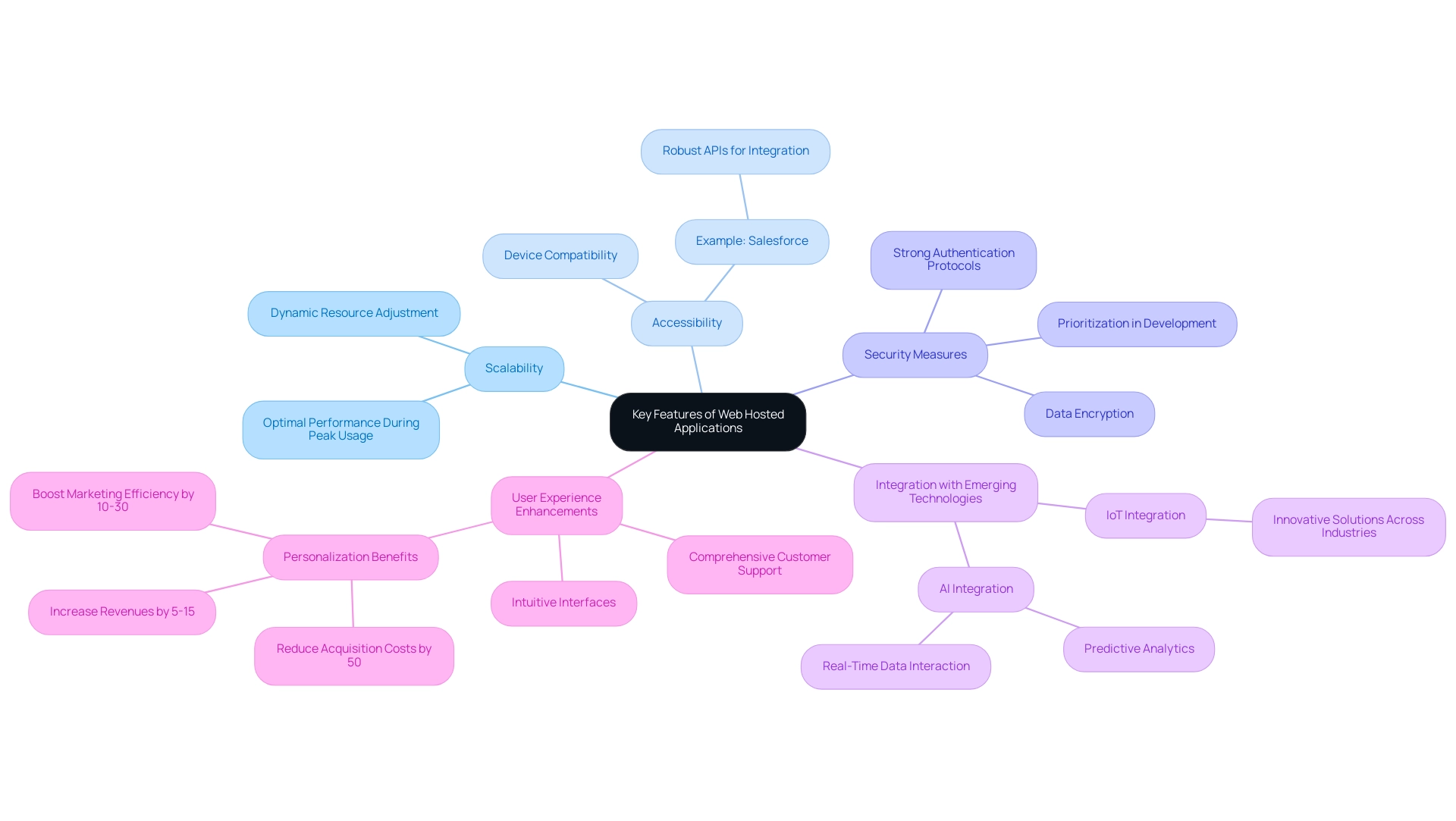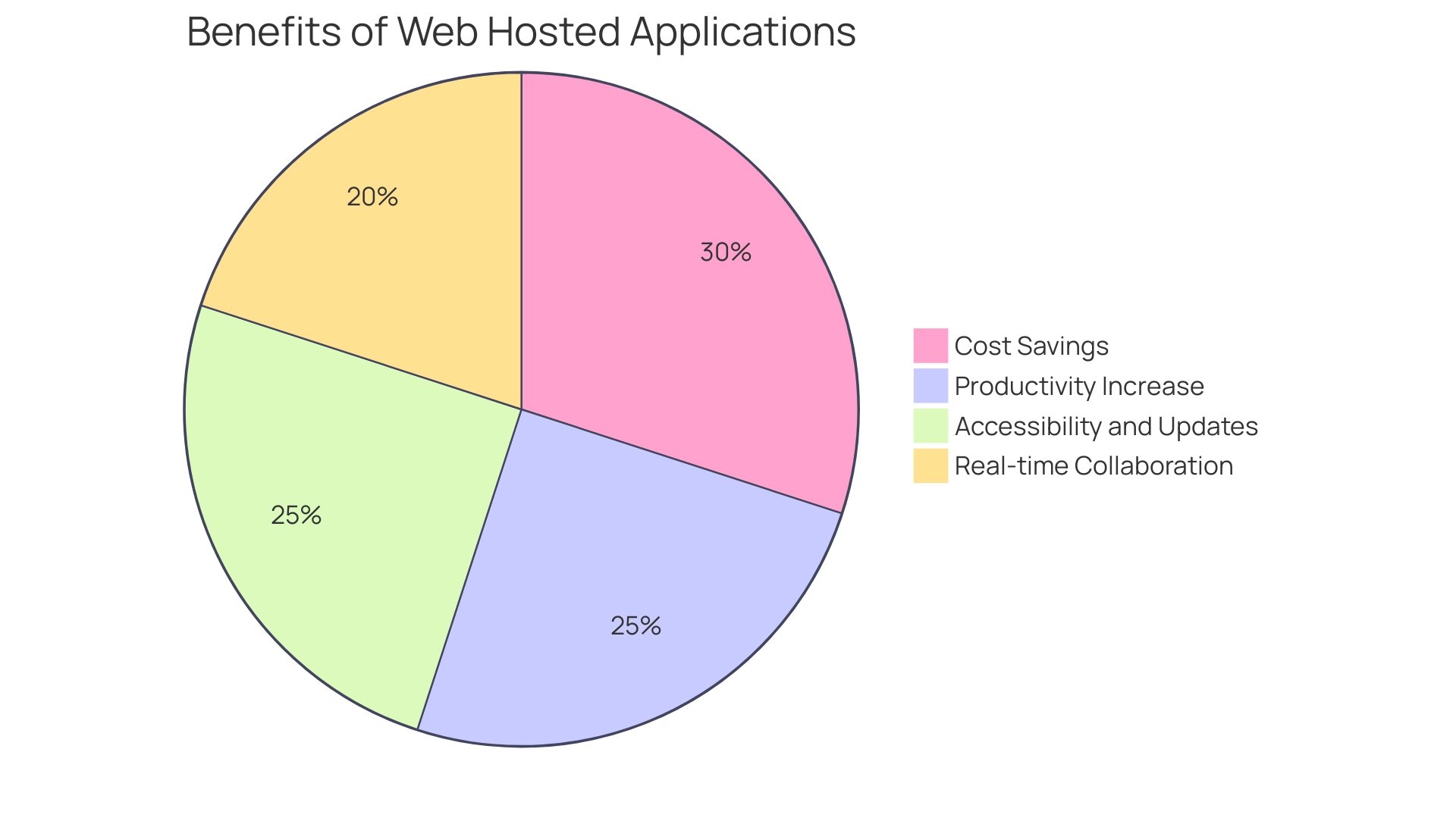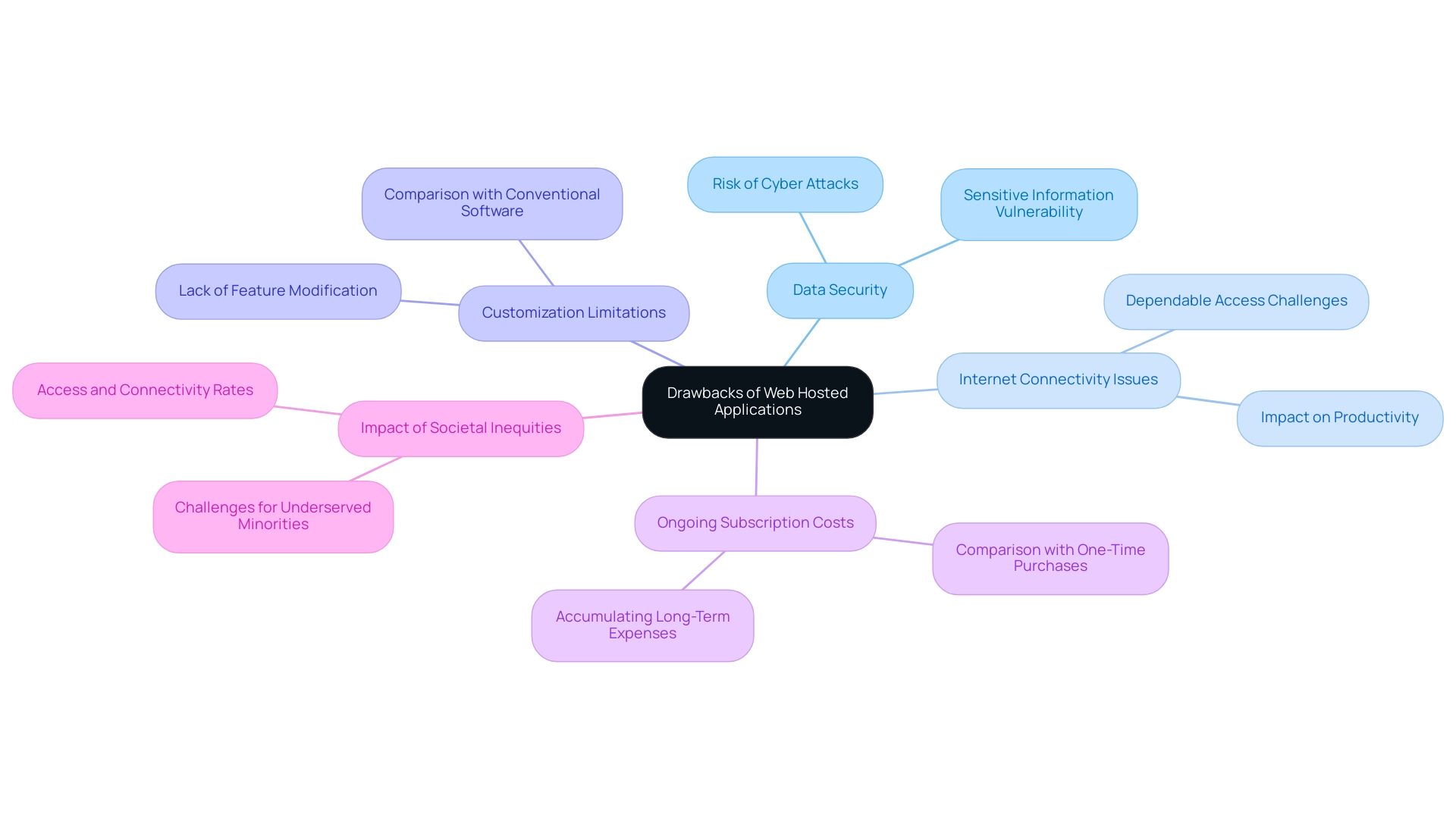Introduction
In the rapidly evolving landscape of technology, web-hosted applications have emerged as a pivotal solution for businesses seeking to enhance their digital capabilities. These applications, which operate on remote servers and are accessible via the internet, offer a dynamic alternative to traditional software installations, facilitating real-time collaboration and streamlined workflows.
As organizations consider the transition to web-hosted solutions, understanding the nuances of these applications—ranging from their key features and benefits to potential drawbacks—is essential. This article delves into the fundamental aspects of web-hosted applications, providing insights into their operational efficiencies, security considerations, and the strategic advantages they confer in a competitive marketplace.
By exploring these elements, businesses can make informed decisions that align with their digital strategies and operational goals.
Understanding Web Hosted Applications: Definition and Differences
Web hosted applications are sophisticated software solutions that operate on remote servers and are accessed through the internet, setting them apart from traditional software that requires local installation. In contrast to conventional sites, which usually provide static content, online programs offer dynamic functionalities and interactive features that enhance user engagement. A prime example is Google Docs, where users can collaboratively create and edit documents in real-time, demonstrating the potential of online applications to facilitate seamless communication and productivity.
Grasping these differences is crucial for companies considering a shift to web hosted applications, as they directly influence strategy and operational efficiency. This shift not only allows for enhanced interactivity but also aligns with the growing trend towards more integrated and responsive digital experiences. Additionally, enterprise software often necessitates more extensive testing and planning before updates are released, highlighting the importance of a robust infrastructure.
Web hosted applications function on a client-server model, requiring a web server, processing server, and database for their functionality. Furthermore, the choice between web, native, and hybrid programs depends on budget, target audience, and specific use cases, as illustrated in the case study comparing these types.

Key Features of Web Hosted Applications
Essential features such as scalability and accessibility define web hosted applications. Scalability allows businesses to adjust resources dynamically according to demand, ensuring optimal performance during peak usage. Accessibility allows users to engage with software from any device equipped with internet connectivity, fostering a more flexible work environment.
A prime example of this is Salesforce, a CRM tool that boasts robust APIs for seamless integration with various email marketing platforms, thereby streamlining workflows and enhancing productivity. According to industry insights, optimizing personalization in user experiences can lead to a remarkable reduction in acquisition costs by as much as 50%, alongside an increase in revenues by 5-15% and a boost in marketing efficiency by 10-30%, as noted by Abdul Hakeem. Furthermore, the latest web hosted applications incorporate advanced security measures, including strong authentication protocols and encryption, which are critical in protecting user data and maintaining trust.
It is essential for developers to prioritize these security measures in today's digital landscape. Additionally, the integration of IoT and AI into custom web solutions enhances their functionality, allowing for intelligent features such as predictive analytics and real-time data interaction. Furthermore, organizations using online tools can liberate up to 50% of their team's time, greatly enhancing overall efficiency.
Other vital features that contribute to a superior user experience encompass:
- Intuitive interfaces
- Comprehensive customer support options
- Integrations with emerging technologies
These collectively enhance the versatility and effectiveness of web hosted applications.

Benefits of Web Hosted Applications: Why Choose Them?
Web hosted applications provide a multitude of benefits for enterprises, mainly due to their cost-efficiency. Compared to traditional software, they often entail lower upfront investments, allowing organizations to circumvent substantial licensing fees. For instance, businesses can save up to 30% in operational costs by subscribing to services that encompass ongoing updates and support, enhancing financial efficiency.
Urjashee Shaw, a full stack developer with more than seven years of experience, emphasizes that these tools not only streamline costs but also facilitate real-time collaboration among teams. For example, platforms like Slack and Microsoft Teams illustrate how web services enable instant communication, file sharing, and integration with various tools, thereby nurturing a collaborative work environment. A case study titled 'Competitive Advantages of Web Hosted Applications for Business' highlights that organizations utilizing web hosted applications have experienced a 25% increase in productivity and a significant reduction in operational costs.
Moreover, the ability to access software from any device combined with automatic updates ensures users always benefit from the latest features and security enhancements. Such traits render web hosted applications increasingly attractive to contemporary companies that aim to enhance productivity while preserving operational flexibility.

Drawbacks of Web Hosted Applications: What to Consider
While web hosted applications offer significant advantages, they also present notable drawbacks that must be carefully considered. A primary concern is data security; sensitive information stored on remote servers is at risk of cyber attacks if not rigorously protected. As LeeAnn Stone observes,
There is no single technological divide in education but rather a host of complex factors that shape technology use in ways that serve to exacerbate existing education inequalities.
This viewpoint applies to enterprises, where insufficient online security protocols can worsen vulnerabilities, especially for underserved minorities and low-income households who may encounter extra obstacles to obtaining dependable internet access. Furthermore, statistics indicate that 28% of employees making gift purchases intend to do so while at work, underscoring the necessity for uninterrupted access to applications—something that can be severely affected by internet connectivity issues. Disruptions in internet service can lead to significant productivity losses, as employees are unable to access critical tools when needed.
The case study titled 'Obstacles to Teaching Technology Skills' highlights how inadequate teacher training and lack of standardized curriculum hinder effective literacy instruction, resulting in uneven educational outcomes. This is pertinent for enterprises as they manage online tools; many users discover that web hosted applications do not provide the same degree of customization found in conventional software, which restricts their capability to modify features to meet specific organizational needs. Lastly, the ongoing subscription costs associated with these applications can accumulate over time, potentially leading to higher long-term expenses compared to a one-time software purchase.
By understanding these drawbacks, including the impact of societal inequities on access and the importance of digital literacy, businesses can make more informed decisions regarding their digital toolset.

Conclusion
The exploration of web-hosted applications reveals their transformative potential for businesses aiming to enhance their digital strategies. These applications stand out by operating on remote servers, offering dynamic functionalities that promote real-time collaboration and increased productivity. Key features such as:
- Scalability
- Accessibility
- Robust security measures
play a vital role in their appeal, enabling organizations to adapt swiftly to changing demands while maintaining the integrity of user data.
Despite the numerous advantages, it is crucial to acknowledge the challenges associated with web-hosted applications. Data security remains a paramount concern, particularly in the face of cyber threats. Additionally, issues surrounding internet connectivity can disrupt access to essential tools, impacting overall productivity. The ongoing subscription costs, while initially lower than traditional software, can accumulate over time, necessitating careful financial planning.
Ultimately, the decision to adopt web-hosted applications should be guided by a comprehensive understanding of both their advantages and potential drawbacks. By weighing these factors, businesses can strategically position themselves in a competitive marketplace, leveraging the benefits of web-hosted solutions while implementing necessary safeguards to mitigate risks. As the digital landscape continues to evolve, embracing these innovative tools can lead to significant operational efficiencies and enhanced collaboration, paving the way for future growth and success.





